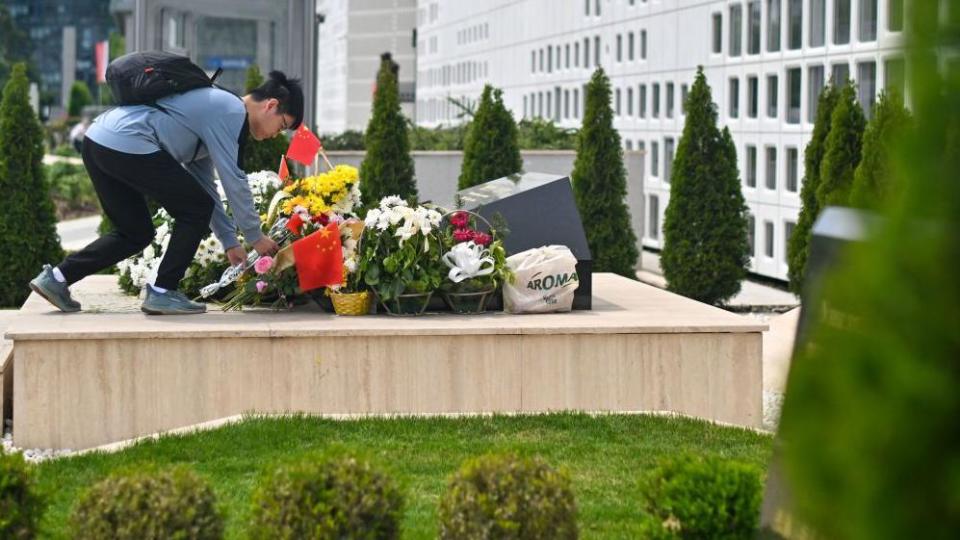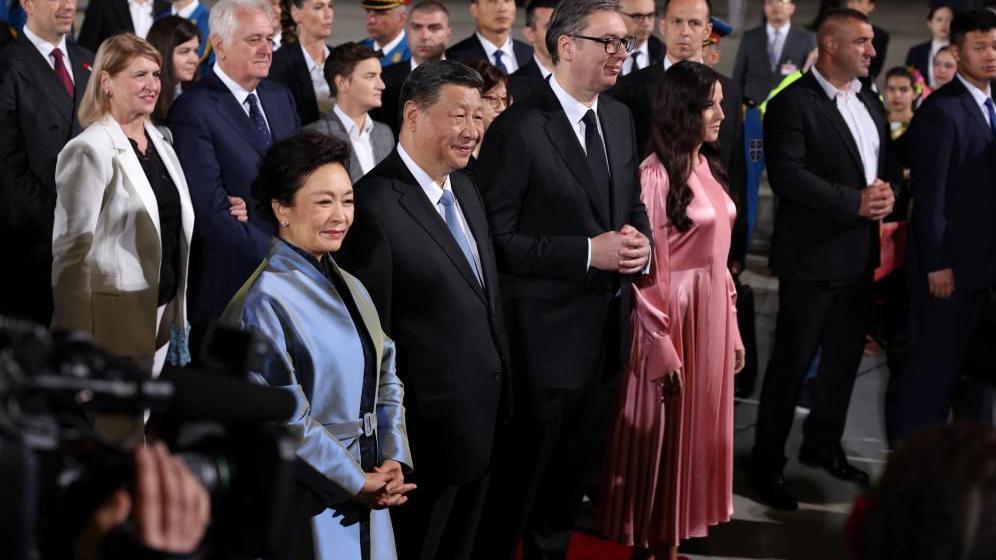The red flags start at Belgrade’s Nikola Tesla Airport and run all the way along the motorway into the centre of Serbia’s capital.
This is Serbia’s way of showing that it is proud of its “ironclad friendship” with China – and welcoming Xi Jinping to Belgrade.
At the Western City Gate, more commonly known as the Genex Tower, one entire tower is draped in China’s national colours.
Just for good measure, there is a billboard for Hisense, the Chinese home appliances manufacturer which opened a refrigerator factory in Valjevo, western Serbia, last year.
In some parts of Europe, the Chinese president’s itinerary might have raised eyebrows. After all, it is not often that Serbia finds itself as part of a three-stop tour by an international leader of such stature.
But Serbia has been deepening its relationship with China in recent years, even as it continues with negotiations to join the European Union.
Mr Xi is likely to use his trip to highlight his criticisms of Nato. His visit coincides with the 25th anniversary of the US airstrikes on China’s embassy in Belgrade. And in an editorial for the Serbian newspaper, Politika, the president made it clear that feelings over that incident still run high.
“We should never forget,” he wrote. “The Chinese people cherish peace, but we will never allow such tragic history to repeat itself.”
That kind of rhetoric resonates in Serbia, where the vast majority of people oppose Nato membership. That is a key factor in why this stop on Mr Xi’s European tour makes perfect sense.

Commercial connections are also a factor. The two countries signed a free trade agreement last year, building on a “comprehensive strategic partnership” in 2016 – the year of Mr Xi’s previous visit to Serbia.
China now claims to be the largest source of foreign direct investment (FDI) in Serbia. Its ambassador, Li Ming, says that Hisense, along with mining company Zijin and tyre manufacturer Linglong, provide 20,000.
UN trade figures actually put China in fifth place on the foreign direct investment list, behind Germany, Italy, the US and Russia.
Nonetheless, the Chinese investments are eye-catching – and only likely to increase. Serbia has just taken delivery of its first Chinese electric high-speed trains. They will eventually run alongside Swiss-made rolling stock on the Belgrade-Budapest railway, which is being reconstructed with Chinese expertise and finance.
And that is just the start. Serbia’s infrastructure minister, Goran Vesic, says Chinese partners will work on other infrastructure, including roads, bridges, tunnels and sewage. “There is really a lot of room for co-operation with Chinese companies,” he told Serbia’s national broadcaster, RTS.
No wonder Serbia’s president, Aleksandar Vucic, is planning to personally serve the finest wines his country has to offer to his Chinese counterpart during a banquet in Mr Xi’s honour.
Noting that within five years Serbian wine will face no import tariffs in China, Mr Vucic told China Central Television that Serbian wines were “not as expensive as [those] in France” and that he believed Mr Xi was “going to like” his selections.
This was perhaps a gentle dig at Emmanuel Macron, who hosted Mr Xi for the first stop on his European trip. The French president’s offering was a bottle of Rémy Martin Louis XIII cognac, which would cost the best part of €5,000 in Belgrade.
A trip to the Pyrenees was also included in the charm offensive – to sweeten pleas by Mr Macron and European Commission President Ursula von der Leyen for Mr Xi to ensure more balanced trade with Europe and influence Russia’s President Vladimir Putin to end the war in Ukraine.
After Belgrade, the next stop for China’s president will be Budapest, where he will meet his strongest ally among the leaders of EU member states, Hungarian Prime Minister Viktor Orban.
Chinese investments are also a strong factor there – with a factory for electric car giant BYD among the projects that buttress Mr Orban’s resistance to the EU consensus on everything from migration to providing arms to Ukraine.
